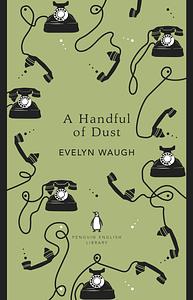Take a photo of a barcode or cover
The brutality of the final third of this book is something to behold. It felt fitting that I finished it the day after the American people chose to elect Donald Trump for a second term. We are all just being held against our will and tortured—Just like Tony Last.
Waugh’s novel makes me think of a curious little pen knife kept under plate glass display at an antique shop: a decorative little handle, perhaps delicately wrought in chrome, looking charmingly innocuous nestled among the moldering paste jewelry and assorted tchotchkes. But then, with the flick of a finger, the blade appears—unexpectedly sharp, dazzlingly shiny, potentially cruel. Careful now: Waugh might cut you.
A Handful of Dust is perhaps similarly deceptive, especially when read today. Like an alluring little relic of another age, it satirizes the values and behaviors of an era that today feel quite distant and removed. And yet, despite their obvious foibles I actually liked both Brenda and Tony Last, Downton Abbey-esque minor aristocracy whose happy-seeming seven year marriage suddenly but somewhat understandably begins to spiral. Quietly and unobtrusively things for the Lasts run off the rails, even if neither partner seems particularly discontent with their current situation. Instead each drifts about in a cloud of their own preoccupations and unvoiced concerns, making them oblivious to the fact that there is, in fact, quite a bit amiss. It’s a chilling indictment of how quiet enervation can be just destructive as fiery confrontation.
Which perhaps gives a misleading description of a novel which remains on the whole quite jaunty. Not exactly laugh-out-loud funny, the humor is instead incredibly dry—and perhaps a bit brittle—employing wordplay and double entendre (ie “Lady Cockpurse”) and acerbic caricature (the failed, faux-oriental vamp “Princess” Julie Abdul Akbar). But stealthily the glamor of London society rituals give way to an underlying despair—it’s not for nothing that the title and opening epigraph are plucked from Eliot’s “The Waste Land.”
Invoking that great landmark of literary modernism is apt for other reasons as well: though not as obviously experimental as Eliot’s poem, I was consistently impressed by the novel’s elegantly economical style. The reliance on dialogue and verbal interchange to convey meaning is almost cinematic, also emphasized in the way scenes are cut into small little snippets that skip around like so many jump cuts. Given the obvious technical mastery on display, I should have had more confidence in authorial control when the last third of the novel juts out into unexpected territory; I admit that for a while I was worried the story had gone irremediably awry just like the Last’s marriage. I need not have worried though, as everything plays itself out with a brutal efficiency and shocking force.
The Penguin Classics (UK edition) I own includes an alternate ending as an appendix, originally attached to an American serialized version of the novel for legal reasons. It’s certainly a much more conventional resolution, but even if it doesn’t contain the same jolt as the intended conclusion there’s still something deeply haunting about it. Perhaps, it seems to ask, reconciliation was indeed possible for the Lasts via roads not taken. But for how long? At the very last moment a turn is taken, and the entire cycle seems to snap back into place, poised to begin yet again.
A Handful of Dust is perhaps similarly deceptive, especially when read today. Like an alluring little relic of another age, it satirizes the values and behaviors of an era that today feel quite distant and removed. And yet, despite their obvious foibles I actually liked both Brenda and Tony Last, Downton Abbey-esque minor aristocracy whose happy-seeming seven year marriage suddenly but somewhat understandably begins to spiral. Quietly and unobtrusively things for the Lasts run off the rails, even if neither partner seems particularly discontent with their current situation. Instead each drifts about in a cloud of their own preoccupations and unvoiced concerns, making them oblivious to the fact that there is, in fact, quite a bit amiss. It’s a chilling indictment of how quiet enervation can be just destructive as fiery confrontation.
Which perhaps gives a misleading description of a novel which remains on the whole quite jaunty. Not exactly laugh-out-loud funny, the humor is instead incredibly dry—and perhaps a bit brittle—employing wordplay and double entendre (ie “Lady Cockpurse”) and acerbic caricature (the failed, faux-oriental vamp “Princess” Julie Abdul Akbar). But stealthily the glamor of London society rituals give way to an underlying despair—it’s not for nothing that the title and opening epigraph are plucked from Eliot’s “The Waste Land.”
Invoking that great landmark of literary modernism is apt for other reasons as well: though not as obviously experimental as Eliot’s poem, I was consistently impressed by the novel’s elegantly economical style. The reliance on dialogue and verbal interchange to convey meaning is almost cinematic, also emphasized in the way scenes are cut into small little snippets that skip around like so many jump cuts. Given the obvious technical mastery on display, I should have had more confidence in authorial control when the last third of the novel juts out into unexpected territory; I admit that for a while I was worried the story had gone irremediably awry just like the Last’s marriage. I need not have worried though, as everything plays itself out with a brutal efficiency and shocking force.
The Penguin Classics (UK edition) I own includes an alternate ending as an appendix, originally attached to an American serialized version of the novel for legal reasons. It’s certainly a much more conventional resolution, but even if it doesn’t contain the same jolt as the intended conclusion there’s still something deeply haunting about it. Perhaps, it seems to ask, reconciliation was indeed possible for the Lasts via roads not taken. But for how long? At the very last moment a turn is taken, and the entire cycle seems to snap back into place, poised to begin yet again.
I might come back to it, but I'm just not able to maintain a focus on the material right now.
I wish I could give this book more stars, the pretentious side of me really wants to, but I cannot. Although the book is very wry and definitely a shrewd social commentary on the decline of the upper class throughout the early 20th century. However, without the introduction in the Penguin edition, I would have missed the finer points. The imagery definitely requires reflection, and in my case, footnotes. Overall it was an enjoyable light read to pass the time. Therefore the book gets three stars.
All of that said, the book makes it clear that Waugh was a masterful writer. The references and allusions in the novel that make it quite as cutting as it is are truly genius. If I were rating the novel on skill alone it would easily get 5/5 stars. That's not what I'm doing here though, my rating is a reflection of how much I enjoyed the novel overall. Definitely worth the read but nothing utterly mindblowing in terms of storyline.
All of that said, the book makes it clear that Waugh was a masterful writer. The references and allusions in the novel that make it quite as cutting as it is are truly genius. If I were rating the novel on skill alone it would easily get 5/5 stars. That's not what I'm doing here though, my rating is a reflection of how much I enjoyed the novel overall. Definitely worth the read but nothing utterly mindblowing in terms of storyline.
Things take an unfortunate turn for Tony Last... the later bit will catch you off guard, guaranteed.
emotional
funny
reflective
sad
medium-paced
Plot or Character Driven:
A mix
Strong character development:
Complicated
Loveable characters:
Complicated
Diverse cast of characters:
No
Flaws of characters a main focus:
Yes
sad
slow-paced
Moderate: Infidelity
Minor: Child death, Confinement
Satire in writing is lost on me, though I did laugh out loud a few times.




